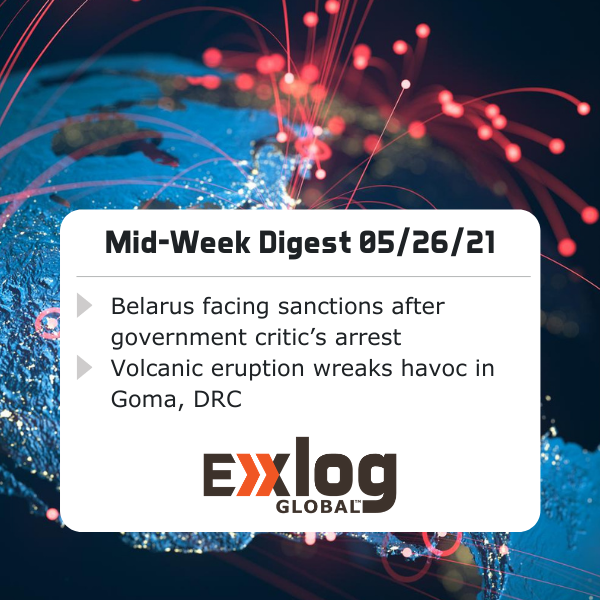Belarus: Arrest of government critic Roman Protasevich after “hijacking” of commercial flight draws international condemnation
European Union leaders are imposing sanctions and air restrictions against Belarus following the forced landing of a Ryanair flight in Minsk and the subsequent arrest of exiled government critic Roman Protasevich. Under the guise of a potential bomb threat made by Palestinian militant group Hamas, Belarusian officials forced the Ryanair flight bound to Lithuania from Greece to land, then took Protasevich and his girlfriend into custody. Protasevich, an outspoken critic of President Alexander Lukashenko, had been wanted on charges of inciting public disorder and social hatred following mass anti-government protests in Aug. 2020.
Since his arrest, Protasevich posted a video from a detention center claiming he was in good health and was providing confessional testimony for organizing mass unrest; his allies claim the video demonstrates that the statements were likely made under duress. The arrest has generated international condemnation from the EU, US, & Ukraine, and has been deemed “state-sponsored aviation piracy and hijacking” by Ryanair and several world leaders. Following a meeting of the EU on May 24, leaders instructed all bloc airlines to no longer fly through Belarusian airspace and petitioned that Belavia—Belarus’ national airline—have its operating permits revoked. So far, Air France and its subsidiaries, British Airways, and Finnair have banned all overflight of Belarus, while Polish national carrier LOT and Ukrainian carriers have banned all flights over & into Belarus – Singapore Airlines has also banned all overflight. Surrounded by three EU nations and Ukraine, such restrictions could isolate Belarus from most of Europe; however, it would be costly and time-consuming for airlines crossing between Europe & Asia to divert around the country.
The EU is also limited in the pressure it can place on Belarus, as it only has the capacity to restrict flights that originate or land in the bloc. Further sanctions against Lukashenko and other officials are currently being discussed by the EU and US, along with potential land-based freight transport bans. However, it is unlikely that international sanctions will have an immediate effect if any at all – past Western efforts to exert pressure on Belarus have had little impact as Russia remains their most staunch international ally and financial backer.
DRC: Volcanic eruption in Goma results in dozens of fatalities, essential resource disruptions
The Democratic Republic of Congo’s Mount Nyiragongo, located approximately 6 mi. from the city of Goma, erupted on May 22, resulting in at least 32 deaths, widespread damage, and the loss of essential resources. The eruption began without warning on the evening of May 23 and continued into the early morning of May 24. A fissure on the volcano’s eastern flank released a lava flow estimated to be half a mile wide and as high as three stories in some locations. The lava flow reached 17 villages before stopping approximately 650 feet from the Goma city limits and cutting off the N2 highway, while the resulting ash cloud has forced Goma and Bukavu airports to close until further notice.
The combination of these two disruptions is expected to drastically hinder relief and recovery efforts in the near term, as the blockage of N2—the main trade and humanitarian aid route into the city—and closures of the nearby airports leave humanitarians with limited options to reach the city. The lava has also cut the power and clean water supply to large portions of the city. Tens of thousands of people evacuated, with approximately 5000 crossing the border into Rwanda. Although only 32 fatalities have been reported, that number is expected to increase as at least 320 people remain missing, including 170 children. North Kivu Province, where Goma and Mt. Nyiragongo are located, has long been the center of a humanitarian crisis due to an influx of refugees fleeing conflict in surrounding areas.
Humanitarian efforts that were previously overextended before the eruption will need to be re-doubled to meet people’s basic needs. UNICEF and the UNHCR have deployed teams to set up water chlorination sites, shelters, and transit stations to help reunite families. As of May 26, volcanic ash clouds have slowly dissipated per the Volcanic Ash Advisory Centre Toulouse, and the the lava has begun to cool. Experts still fear that subsequent earthquakes in the region have the potential to cause additional fissures or eruptions, further exacerbating ongoing recovery efforts. UNHCR researchers have stated that the lava lake appears to have refilled following the initial fissure, suggesting ongoing tremors are likely to induce another eruption in the near term.


